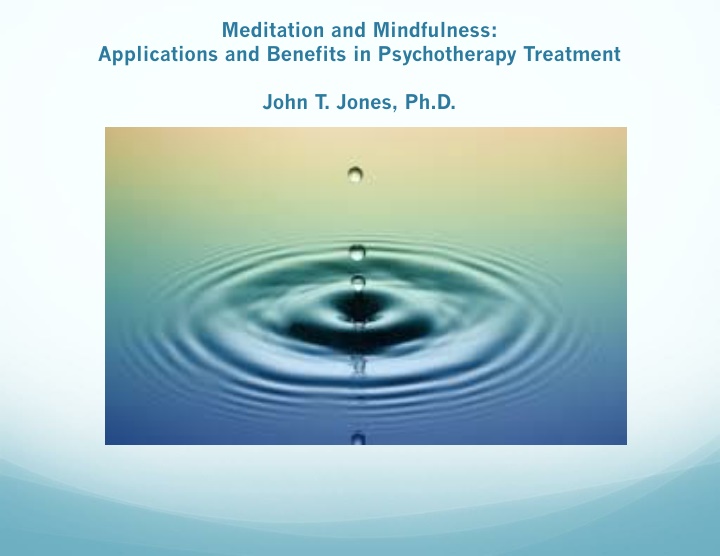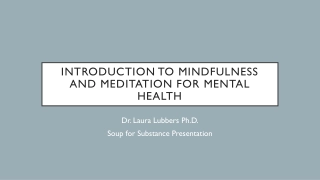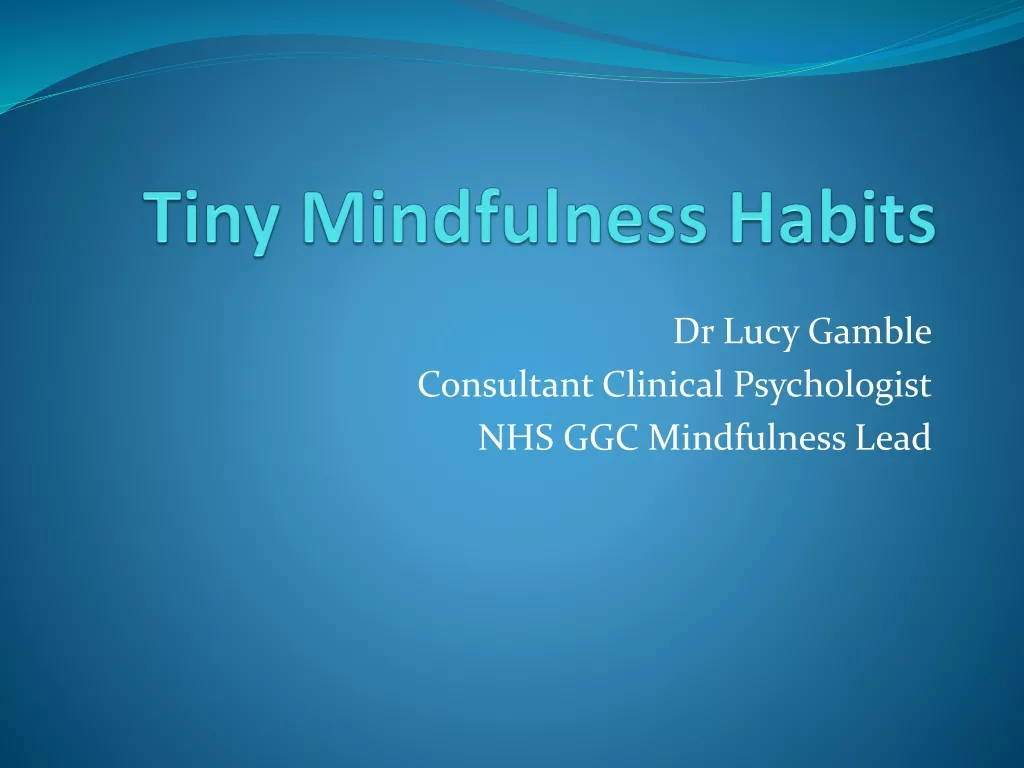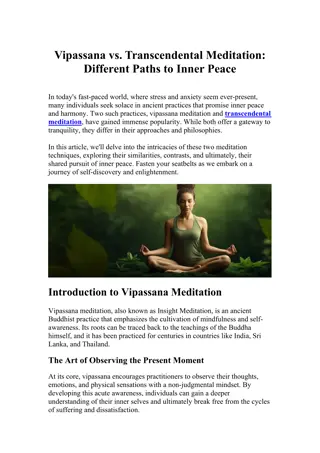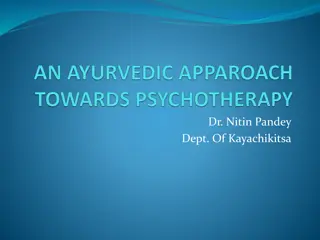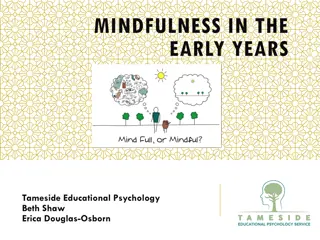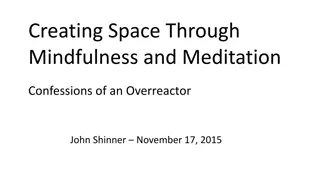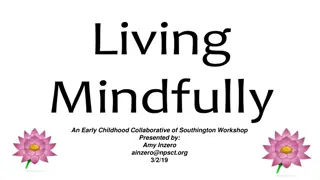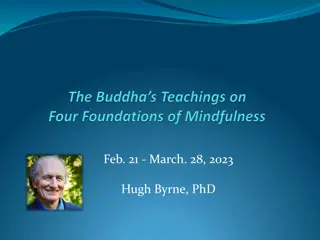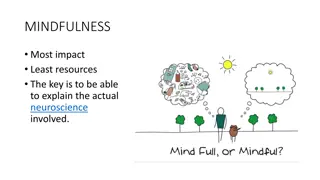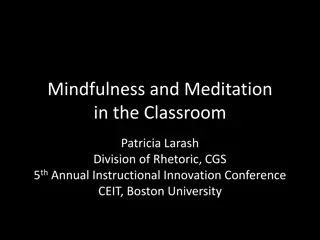Meditation and Mindfulness in Psychotherapy: Applications and Benefits
The applications and benefits of meditation and mindfulness in psychotherapy treatment. Learn about the history, research, and theoretical developments of practices like Mindfulness-Based Cognitive Therapy (MBCT) and Acceptance and Commitment Therapy (ACT). Discover the impact of training the mind and cultivating mindfulness on judgment, character, and willpower. Dive into the work of influential figures such as Jon Kabat-Zinn and Marsha Linehan in this insightful journey towards holistic well-being.
Download Presentation

Please find below an Image/Link to download the presentation.
The content on the website is provided AS IS for your information and personal use only. It may not be sold, licensed, or shared on other websites without obtaining consent from the author.If you encounter any issues during the download, it is possible that the publisher has removed the file from their server.
You are allowed to download the files provided on this website for personal or commercial use, subject to the condition that they are used lawfully. All files are the property of their respective owners.
The content on the website is provided AS IS for your information and personal use only. It may not be sold, licensed, or shared on other websites without obtaining consent from the author.
E N D
Presentation Transcript
Meditation and Mindfulness: Applications and Benefits in Psychotherapy Treatment John T. Jones, Ph.D.
Training the Mind The faculty of voluntarily bringing back a wandering attention, over and over again, is the very root of judgment, character, and will. No one is compos sui if he have it not. An education which should improve this faculty would be the education par excellence. But it is easier to define this ideal than to give practical instructions for bringing it about. (William James, 1890)
Brief History of Research & Theoretical Developments Herbert Benson - (TM) - The Relaxation Response (1975) Jon Kabat-Zinn (MBSR) Full Catastrophe Living (1990) Dialectical Behavior Therapy (DBT) Marsha Linehan Book and treatment manual (1993) Acceptance and Commitment Therapy (ACT) Steven Hayes First Edition Published (1999)
Brief History of Research & Theoretical Developments Mindfulness Based Cognitive Therapy (MBCT) - Segel, Williams, Teasdale The Mindful Way Through Depression: Freeing Yourself From Chronic Unhappiness (2007) Mindfulness Based Relapse Prevention (MBRP) (Bowen, Chawla and Marlatt, 2010) is a novel treatment approach developed at the Addictive Behaviors Research Center at the University of Washington, for individuals in recovery from addictive behaviors.
What Is Meditation? Three Broad Categories: - Concentration Forms - Opening-Up (Mindfulness) Forms - Compassion
Concentration Forms Focused Attention Calm Abiding Shamatha Samadhi
Opening-Up Forms Open-Monitoring Insight Special Insight Vipasyana (Vipassana) Mindfulness
Compassion Meditation Meta Practice Loving-Kindness Tonglen
Mindfulness A Definition The awareness that emerges through paying attention on purpose, in the present moment, and nonjudgmentally to the unfolding of experience moment by moment. (Jon Kabat-Zinn)
Mindfulness Is Far More Than Tidying Up Your Mind
Mindfulness Mindfulness in its most general sense is about waking up from a life on automatic, and being sensitive to novelty in our everyday experiences. With mindful awareness the flow of energy and information that is our mind enters our conscious attention and we can both appreciate its contents and also come to regulate its flow in a new way. Mindful awareness actually involves more than just simply being aware: It involves being aware of aspects of the mind itself. Instead of being on automatic and mindless, mindfulness helps us awaken, and by reflecting on the mind we are enabled to make choices and thus change becomes possible. (Daniel Siegel)
Selected Benefits of Mindfulness Practice Relieving Anxiety Relieving Depression Relieving Pain Increased Awareness Emotion Regulation Evokes Relaxation Response
I should also say one of the roots of the word meditation in Sanskrit comes from the word familiarization. And according to that definition, meditation is actually familiarizing yourself with your own mind. I would go so far as to say that I believe that for anyone who is a student of the mind, a student of psychology, doing meditation would be very useful, because it is a practice in which they can become more familiar with their own mind, and I think that it can help them become better psychologists. (Richard J. Davidson)
